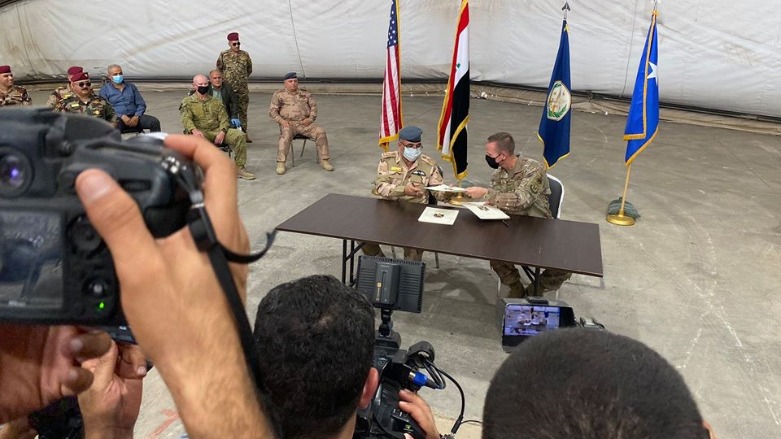Coalition hands over major base, Camp Taji, to Iraqi forces

ERBIL (Kurdistan 24) – The US-led coalition against ISIS, formally known as Combined Joint Task Force-Operation Inherent Resolve (CJTF-OIR), held a ceremony on Sunday to turn over the Taji military base back to the Iraqi Security Forces (ISF.)
Taji is a huge, sprawling facility, located some 20 kilometers north of Baghdad. It was originally built as a base for Iraq’s Republican Guards during the reign of Saddam Hussein, when it was also a major facility for manufacturing chemical weapons.
Taji was heavily bombed during the 1991 Gulf War, and in 2003, when US forces returned to Iraq, they took it over for their own use. Iraqis recovered the base in 2011, when US forces left the country—only to return three years later to fight ISIS.
Since the spring of this year, the US-led Coalition has been consolidating its position in Iraq. The move is driven in part by success in the territorial defeat of ISIS, and in part, it is a force protection measure, as pro-Iranian militias continue to target the Coalition presence in Iraq.
Read More: Coalition to continue Iraq operations, as Patriot missiles arrive, and base consolidation proceeds
A Coalition statement, issued on the occasion of the base transfer, explained that for the past six years, since the US-led war against ISIS began, some 2,000 Coalition troops were regularly stationed at Taji.
The statement also explained, “The movement of Coalition military personnel is part of a long-range plan coordinated with the government of Iraq.”
The camp has been a crucial venue for training the ISF, including the Air Force, Special Forces, and Army. Over 47,000 Iraqi military personnel have been trained there on operational skills, according to the Coalition statement.
In addition to returning the base to Iraqi control, the Coalition handed over equipment worth some $347 million to the ISF, the statement said, as it noted that was “the highest dollar figure of any base transfer”—a number that suggests the size and importance of the base.
Following the completion of the equipment transfer, the remaining coalition troops will permanently leave the base, according to the statement.
Today’s hand over marks the eighth transfer of a military facility from the Coalition to the Iraqi government. Taji camp, as well as others, have been subject to multiple rocket attacks from Iranian-backed militia groups, going back many months.
Read More: Twin rockets hit Taji military base following US-Iraq Strategic Dialogue
Following an attack on the K-1 base near Kirkuk that killed a US contractor in late December, a US drone strike assassinated Iranian Commander Qassim Soleimani, near Baghdad’s International Airport, as he flew in from Damascus.
Shiite parties in the Iraqi parliament subsequently demanded the withdrawal of US forces from the country. However, the previous Iraqi government never implemented the measure, while the US and Iraqi governments are currently engaged in a “strategic dialogue” to normalize relations, including military ties, between the two countries.
Chemical Weapons at Taji
In the fall of 2014, as US forces returned to Iraq to fight ISIS, The New York Times published a major investigative report on the discovery of chemical weapons in Iraq during Operation Iraqi Freedom (OIF)—which lasted from 2003 to 2011.
The Times said that the chemical munitions were old, dating back to before the 1991 Gulf War—but contrary to official findings, above all the 2004 report from the Iraq Survey Group, the material remained dangerous.
A handful of the roadside bombs that insurgents used to attack US troops during OIF were, in fact, chemical munitions, the Times reported.
On at least six occasions, US or US-trained Iraqi troops were wounded by such weapons, it said.
Moreover, huge caches of chemical weapons were discovered. The largest such discovery occurred at Camp Taji, where over 2,400 Borak rockets were unearthed, as US troops interrupted an apparent attempt by insurgents to gain possession of them.
The Borak, a 122-millimeter rocket, is designed to deliver nerve agents, including sarin gas.
Sarin is a clear, colorless, and odorless liquid. Because of those properties, individuals exposed to sarin may well not even know it, although it is lethal, even in very small amounts.
At one point, US troops patrolling the sprawling Taji base came across an Iraqi “digging with a front-end loader” who, seeing the Americans, ran away, leaving half-unearthed munitions, the Times explained.
They were Barak rockets, buried in the ground. Some of the munitions were empty, some contained sarin. Subsequently, 38 technical specialists “worked for weeks,” digging up the munitions, “crushing many of them and then reburying them and covering them with concrete,” the Times said.
Editing by Laurie Mylroie
